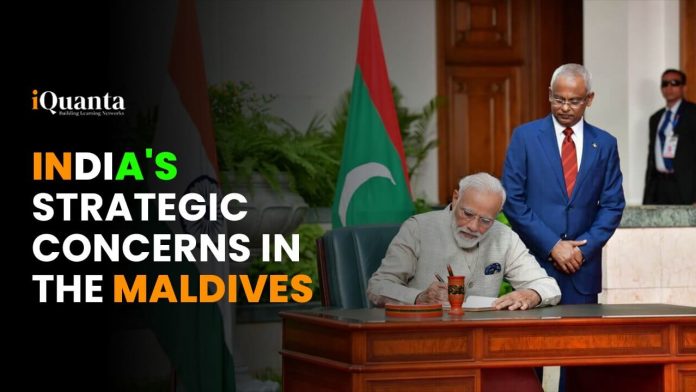Genre : Opinion
The Maldives, an idyllic archipelago in the heart of the Indian Ocean, has once again captured international attention, and India is watching with a sense of unease. The recent presidential election has delivered a significant change in leadership, one that could potentially alter the geopolitical dynamics of the region. Mohamed Muizzu, a candidate with pro-China inclinations, has emerged victorious, raising questions about the future of India-Maldives relations.
In a closely contested election, Mohamed Muizzu secured 54 percent of the votes, defeating the incumbent President Ibrahim Solih, who garnered 46 percent. This outcome holds immense significance for India, as it signals a shift toward a leadership that may be more inclined towards China’s influence in the Indian Ocean region.

Historical Significance of the Maldives with its ties to India
The Maldives, strategically positioned in the Indian Ocean, has long been a part of India’s sphere of influence. Its location is of paramount importance, as around 80 percent of global oil shipments traverse the Indian Ocean, with the Maldives acting as a pivotal toll gate on this critical route. In recent years, China has sought to reduce India’s influence in the Indian Ocean. Beijing has made strategic inroads in the region, notably in Sri Lanka, and now, the Maldives appears to be the next target in its quest for greater influence.
Muizzu’s Pro-China Stance
Mohamed Muizzu, the president-elect, belongs to the Progressive Party of Maldives (PPM), which is known for its pro-China stance. What’s particularly concerning for India is the fact that the PPM has actively advocated for reducing Indian influence in the Maldives, even launching the ‘India out’ campaign.
The election presented two starkly different positions on India’s role in the Maldives. President Solih, the outgoing leader, openly declared his policy as ‘India first,’ emphasizing the importance of the bilateral relationship. In contrast, Muizzu’s PPM championed the idea of diminishing Indian influence. The latter’s victory raises concerns about the future of India-Maldives relations.
During his previous stint as a minister, Muizzu signed multiple agreements with China, including a substantial $200 million deal to connect the Maldives’ capital to the main airport. He also engaged with Chinese communist party officials, underlining his party’s intent to strengthen relations with China.
India’s Involvement in the Maldives
India has been a significant partner in the Maldives’ development, providing financial assistance and support for various infrastructure projects. New Delhi has extended loans and aid amounting to three billion dollars, funding critical initiatives such as schools, bridges, stadiums, and hospitals.
While abandoning India is not a feasible option due to the substantial Indian footprint in the Maldives, President-elect Muizzu may choose to expand China’s presence further. Beijing has expressed interest in establishing a free trade agreement with the Maldives and increasing investments. Whether Muizzu aligns with these interests remains a key question.
The evolving dynamics in the Maldives pose significant strategic challenges for India. Several factors will determine how India navigates this shift:
- Muizzu’s Independence: Muizzu’s ability to make independent decisions, free from external influence, will be a critical factor. His relationship with former President Abdullah Yameen, who sought to diminish India’s role, may influence his policies.
- India’s Approach: India’s stance and engagement with the Maldives will play a pivotal role. PM Narendra Modi’s prompt congratulatory message to Muizzu indicates a willingness to maintain dialogue. Continued engagement, irrespective of Muizzu’s inclinations, is essential to safeguard India’s interests.
- Leveraging Soft Power: India can leverage its historical ties, cultural exchange programs, and people-to-people relations to maintain a foothold in the Maldives. These non-economic aspects could prove invaluable in sustaining the bilateral relationship.
- Multipartisan Support: The election outcome serves as a lesson for Indian policymakers. Relying solely on one political party in neighboring countries is risky. Building multipartisan support ensures a more robust and resilient foreign policy.
Conclusion
As the Maldives prepares for a transition of leadership in November, India faces a complex challenge. The strategic setback resulting from the election of a pro-China president-elect underscores the need for a thoughtful and multifaceted approach. India must proactively engage with the Maldives, recognizing the importance of historical ties and cultural exchanges.
The “neighborhood first” policy remains a cornerstone of India’s foreign relations, but it requires broad support from various stakeholders, including ordinary citizens, opposition parties, and the ruling government. The evolving situation in the Maldives demands careful consideration, as India strives to protect its interests and uphold its role as a regional influencer.
The path forward may be uncertain, but one thing is clear as daylight: India cannot afford to disengage from the Maldives. Maintaining open channels of communication and diplomacy is essential to navigate the changing tides in the Indian Ocean region. While the challenges are significant, they also present opportunities for creative diplomacy and strategic cooperation. India’s response to this evolving situation will shape its influence in the region for years to come.
If any of the exams you’re preparing for concerns General Awareness (MBA, UPSC, GDPI, etc.), you can go for iQuanta’s GK Course.


